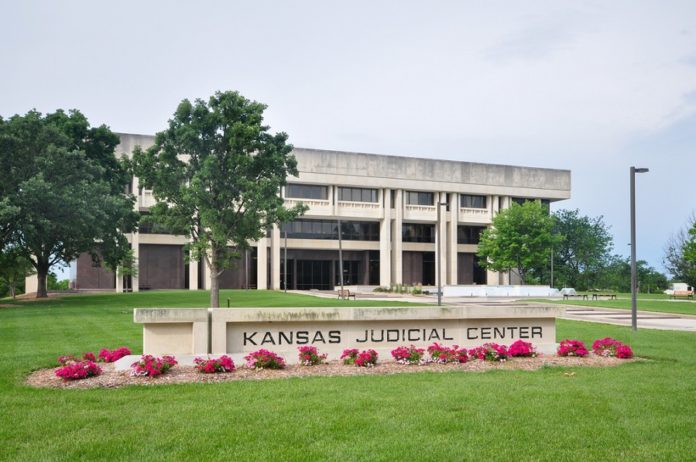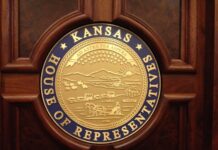The state Supreme Court on Monday decided against temporarily stopping a new state election law that critics said would lead to the prosecution of Kansans registering new voters.
In a one-page opinion issued by Chief Justice Marla Luckert, the court refused to override a lower-court decision not to block a law making it illegal for someone to falsely give the appearance of acting as an election official.
The legal dispute over the temporary injunction halting the law will now proceed through the Kansas Court of Appeals and could still potentially wind back up before the Supreme Court depending on how it unfolds.
“Rapid justice is less important than good justice,” said Pedro Irigonegaray, the attorney for the four civic groups challenging the law.
“I am hopeful that will be the case here – that upon a complete appellate process we will be successful,” he said.
Last month, Shawnee County District Judge Teresa Watson denied a request for a temporary injunction because the law required an intent to mislead the public into believing someone was acting as an election official.
She dismissed the threat claimed by civic groups challenging the law that they could be prosecuted for trying to educate and register new voters if someone wrongly perceived them to be an election official.
In a 15-page opinion, Watson emphasized language in the bill that required someone to “knowingly” give the appearance of misrepresenting an election official.
“‘Knowingly’ means that the actor must be aware of his or her conduct or circumstances and aware that the conduct is reasonably certain to cause the prohibited result,” Watson wrote in her opinion.
“The statute requires a culpable state of mind on the part of the actor; there is no violation based solely on the subjective perception of a bystander.”
Four civic groups – the League of Women Voters of Kansas, Loud Light, the Kansas Appleseed Center for Law and Justice and the Topeka Independent Living Resource Center – had challenged the law in court.
They said the statute had a chilling effect on their efforts to educate and register new voters for fear that they could be prosecuted if someone wrongly perceived them as acting as an election official.
Loud Light and the League Women Voters had shut down their voter registration efforts while the lawsuit played out in court.
They appealed Watson’s decision almost immediately to the Supreme Court, hoping to get an expedited ruling before the Oct. 12 deadline for registering to vote.
The deadline for registering to vote lapsed last week without a ruling from the Supreme Court.
“I am always disappointed when I believe my clients are being irreparably harmed, and every day that goes by that harm continues,” Irigonegaray said.
The state had urged the Supreme Court not consider the appeal.
The state argued that the plaintiffs had already got the court ruling they wanted because Watson found that someone would “knowingly” have to give the false impression of acting as an election official.
The district court’s ruling, the state argued, made it clear that the civic groups can register voters without fear of being prosecuted.
Irigonegaray couldn’t say how each of the civic groups would react to the court’s decision and whether they would resume their voter registration efforts while the case is litigated in the Court of Appeals.
“What I can tell you is that the law creates an unnecessary threat to each of our volunteers,” Irigonegaray said.
“It’s a threat that in my opinion is unconscionable,” he said.
“I disdain the idea that our volunteers are placed risk, but I also understand the immense value that they attribute to Kansans’ right to vote and to do so freely without unnecessary restrictions,” he said.
As of late Friday afternoon, the League of Women Voters had still suspended its voter registration efforts.
“As we are awaiting word on the appeal, the confusion created by the law has still not been resolved,” league co-president Jacqueline Lightcap said in an email Friday.
“We hope for a speedy resolution so that we can begin this critical work again soon.”
In a text message on Friday, Loud Light President Davis Hammet indicated that his group wouldn’t likely resume voter registration efforts without a positive ruling from the Supreme Court.
“Unless we get an order from the Supreme Court, we won’t be able to contact any Kansans to help” get out the vote, he said.
The request for the temporary injunction is separate from a lawsuit challenging the two overall election laws passed by the Legislature this year over the objections of Democratic Gov. Laura Kelly.
The overall lawsuit is still pending in Shawnee County District Court.
Meanwhile, there also is a separate lawsuit in federal court over a new election law that bans anyone who does not live – or is domiciled – in Kansas from mailing an advance mail ballot application to a Kansas voter without their consent.
The law also bars mailing any advance mail ballot application that has been personalized with the voter’s information.
Plaintiffs are seeking a temporary injunction to block the law in federal court.
Hearings have already been heard in the federal lawsuit and a decision is expected any day.
















